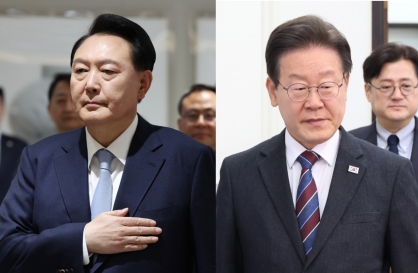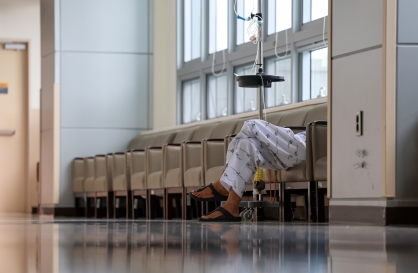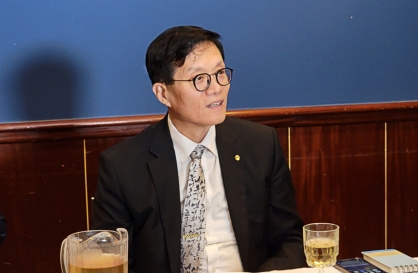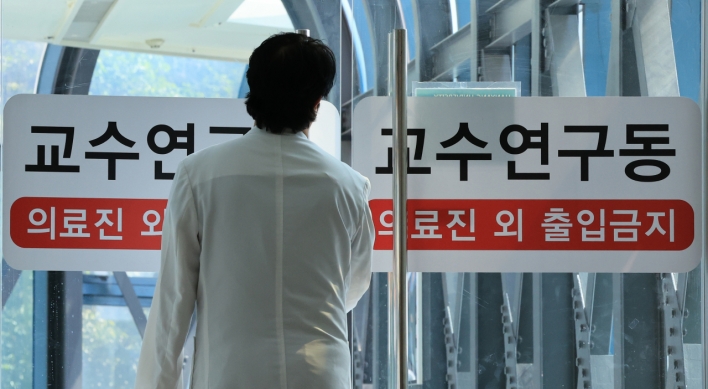Seoul Metro CEO Chang Jung-woo resigned Friday over the subway collision on Line 2 that injured more than 246 people last week.
A train rear-ended another at Sangwangsimni Station on Seoul’s busiest subway line on May 2. The operator said the accident was caused by an apparent mechanical malfunction of its signal system.
A second accident Thursday on Line 1 is likely to have increased the pressure for Chung to resign.
“(Those involved) will be held responsible,” Seoul Mayor Park Won-soon said in a briefing Friday morning. “For now, it is important to find preventive measures and fill the administrative vacuum.”
In less than a week after the Line 2 collision, another subway accident occurred on Line 1 at around 2:35 p.m. on Thursday. The operator said the train backed up for about 300 meters after getting a wrong signal from the monitor.
In the wake of the subway accidents and the tragic ferry accident, the city government said Friday that it will spend about 877 billion won ($877.5 million) to replace aging trains by 2022.
The government said it will replace 500 clunkers equipped with the automatic operation system on Line 2 by 2020, moving up the maintenance four years sooner than initially planned.
The same will be done for 150 trains on Line 3 by 2022 and for 64 trains on Line 1 by next year.
According to the city government’s data, about 36 percent of 1,954 subway trains on Lines 1-4 are frequently out of work.
In addition, Line 2 operations have also been hampered by the use of two different systems ― automatic train operation and automatic train-stopping systems.
The government will also unify control centers under one “SMART integrated control center” from 2019. Currently, each line has its own control center.
The officials said separately-managed operations and overlapping investment have dropped efficiency, and it was about time to upgrade outdated facilities.
In other measures, the operator will consider directly managing services that are closely linked to citizens’ safety and prepare effective crisis-management plans.
A total of 1.88 trillion won, including the money to replace trains, is expected to fund the safety programs, the city said.
“The city government will consider this a turning point to revamp the overall system, prioritizing public safety,” the mayor said.
The mayor also called for the central government’s support, saying the three subway operators in Seoul suffer from yearly deficits of more than 500 billion won.
“We will even take out loans to modernize the facilities,” he said.
Seoul’s subway system is one of the largest in the world in terms of ridership. In 2013, it carried around 6.67 million people per day, according to government data.
By Suk Gee-hyun (monicasuk@heraldcorp.com)
A train rear-ended another at Sangwangsimni Station on Seoul’s busiest subway line on May 2. The operator said the accident was caused by an apparent mechanical malfunction of its signal system.
A second accident Thursday on Line 1 is likely to have increased the pressure for Chung to resign.
“(Those involved) will be held responsible,” Seoul Mayor Park Won-soon said in a briefing Friday morning. “For now, it is important to find preventive measures and fill the administrative vacuum.”
In less than a week after the Line 2 collision, another subway accident occurred on Line 1 at around 2:35 p.m. on Thursday. The operator said the train backed up for about 300 meters after getting a wrong signal from the monitor.
In the wake of the subway accidents and the tragic ferry accident, the city government said Friday that it will spend about 877 billion won ($877.5 million) to replace aging trains by 2022.
The government said it will replace 500 clunkers equipped with the automatic operation system on Line 2 by 2020, moving up the maintenance four years sooner than initially planned.
The same will be done for 150 trains on Line 3 by 2022 and for 64 trains on Line 1 by next year.
According to the city government’s data, about 36 percent of 1,954 subway trains on Lines 1-4 are frequently out of work.
In addition, Line 2 operations have also been hampered by the use of two different systems ― automatic train operation and automatic train-stopping systems.
The government will also unify control centers under one “SMART integrated control center” from 2019. Currently, each line has its own control center.
The officials said separately-managed operations and overlapping investment have dropped efficiency, and it was about time to upgrade outdated facilities.
In other measures, the operator will consider directly managing services that are closely linked to citizens’ safety and prepare effective crisis-management plans.
A total of 1.88 trillion won, including the money to replace trains, is expected to fund the safety programs, the city said.
“The city government will consider this a turning point to revamp the overall system, prioritizing public safety,” the mayor said.
The mayor also called for the central government’s support, saying the three subway operators in Seoul suffer from yearly deficits of more than 500 billion won.
“We will even take out loans to modernize the facilities,” he said.
Seoul’s subway system is one of the largest in the world in terms of ridership. In 2013, it carried around 6.67 million people per day, according to government data.
By Suk Gee-hyun (monicasuk@heraldcorp.com)





![[AtoZ into Korean mind] Humor in Korea: Navigating the line between what's funny and not](http://res.heraldm.com/phpwas/restmb_idxmake.php?idx=644&simg=/content/image/2024/04/22/20240422050642_0.jpg&u=)





![[Herald Interview] Why Toss invited hackers to penetrate its system](http://res.heraldm.com/phpwas/restmb_idxmake.php?idx=644&simg=/content/image/2024/04/22/20240422050569_0.jpg&u=20240422150649)






![[Herald Review] Xdinary Heroes kicks off five-month-long project with solo concert, teases new album](http://res.heraldm.com/phpwas/restmb_idxmake.php?idx=652&simg=/content/image/2024/04/22/20240422050539_0.jpg&u=20240422152154)
![[Today’s K-pop] Illit logs 100m Spotify streams with debut song](http://res.heraldm.com/phpwas/restmb_idxmake.php?idx=642&simg=/content/image/2024/04/22/20240422050650_0.jpg&u=)